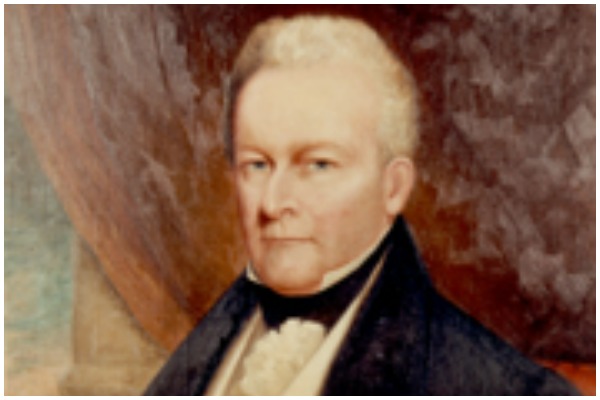Report Finds Over 1,700 Elected Officials Were Once Slaveholders, One Senator Owned a Plantation with Over 400 Enslaved Africans
A new database reveals the number of elected officials in the nation’s history who at some point in their lives owned enslaved Africans: 1,700.
This week the Washington Post published a report about its research into which American politicians owned enslaved Africans.
Sen. Edward Lloyd V of Maryland is named in report highlighting thousands of elected officials who were once slaveholders (Credit: Wiki Commons)
The Post researchers reviewed census records and other historical data to establish the database. The report also noted that not every white male that held office in the newly formed American republic believed that it was right to own people and thus worked diligently for the abolition of the institution.
Some just believed that it was divisive and would die out on its own, without legislation.
This diversity of thought on slavery is reflected in the constant battles to end the institution in the first seven decades of the country’s existence.
The report showed that from 1780 to 1807, in the first 18 years of “American lawmaking,” more than half of Congress owned people.
The enslavers that make up the total database represent 37 of the 50 states, including Northern states like Maine, New Hampshire, Vermont, Massachusetts, Rhode Island, Connecticut, New York, New Jersey, Delaware, and Pennsylvania.
Gradually, laws were passed to limit the importation of African people and impart minimal liberties to Black people.
In 1776, Delaware became the first state to prohibit the importation of African slaves, with Virginia becoming the second in 1780 to not accept African bodies from ships carrying cargo in the Transatlantic Slave Triangle.
Vermont became the first of the thirteen colonies to abolish slavery and the enfranchisement of all adult males in 1778. Pennsylvania’s manumission laws started to form in 1780, slowly ending slavery in the state, while the same year Massachusetts incorporated a freedom clause into its constitution, which was legally interpreted as an abolishment of slavery.
Some of the slaveholders had huge plantations that counted hundreds of human beings as property. In 1832, Sen. Edward Lloyd V of Maryland owned 468 people. One of those persons on the plantation was famed academic and abolitionist Frederick Douglass who lived there as a child.
At the start of the Civil War, 1860 and 1861 saw the secession of 11 Southern states. When those politicians abandoned Congress, 20% of those left still owned slaves. After the Civil War, and even through the Reconstruction period that allowed formerly enslaved Africans to serve the nation through elected leadership, many of those who owned slaves in the North, Midwest, and West, never relinquished their seats.
Democrat William Richardson, a former Confederate vet that served in Alabama for 14 years (dying in office in 1914), was a slave owner. So was Rebecca Latimer Felton, a Georgian Democrat that holds the honor of being the first woman to be elected to the Senate. This suffragist and white supremacist was voted to represent the Peach State.
Seemingly repentant for her participation in slavery once said in her 1919 autobiography, Country Life in Georgia in the Days of My Youth, “There was never a more loyal woman in the South after we were forced by our political leaders to go to battle to defend our rights in ownership of African slaves, but they called it “States’ Rights,” and all I owned was invested in slaves and my people were loyal and I stood by them to the end. Like General Lee, I could not fight against my kindred in a struggle that meant life or death to them.”
“Nevertheless I am now too near the borderland of eternity to withhold my matured conscientious and honest opinion,” she continued.
“If there had been no slaves there would have been no war. To fight for the perpetuation of domestic slavery was a mistake. The time had come in the United States to wipe out this evil. The South had to suffer, and even when our preachers were leading in prayer for victory, during the war, and black-robed mothers and wives were weeping for their dead ones, who perished on the field of battle, I had questions in my own mind as to what would be the end of it.”
Felton took the Senate oath of office on Nov. 21, 1922, and resigned the next day. Being the first woman elected to the Senate was not the only historical title she holds. Another, at 87, is that she is the oldest freshman senator ever to be sworn in.
One less prestigious title she has is being the last member of Congress known to have owned enslaved Africans.
She said that she opposed secession from the States but did not oppose slavery. She said that there were “kind masters and cruel masters.” Felton believed that God was punishing the South for the sins of the bad ones, those that created mixed children with Black women.
“There were violations of the moral law that made mulattoes as common as blackberries,” she wrote in her autobiography. “The retribution of wrath was hanging over this country and the South paid penance in four years of bloody war.”
More news from our partners:
Is This Enough? Santa Monica Offers Descendants of Displaced Black Communities Affordable Housing.
“Tried To Gratify Himself At My Expense” | Deshaun Watson Accuser Pens Open Letter To His Girlfriend

